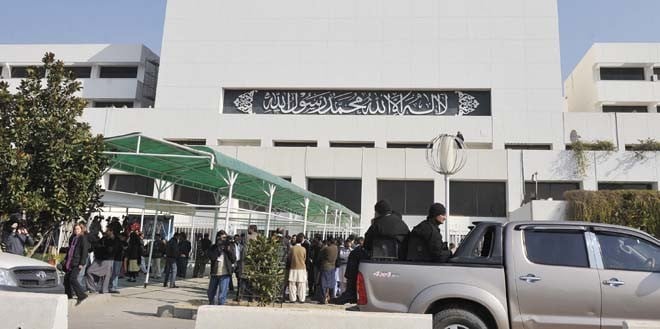

Historically, the primary political choices related to the nature of state in Pakistan have been revolving around the questions of federalism, regional autonomy, decentralisation, ownership of natural resources and politics of multi-polarity within the context of ethno-lingual and regional diversities. Several studies have suggested that the process of state formation in the aftermath of independence in 1947 was predominated by following key areas of contest leading to violent political and cultural conflicts:
- Equitable political and administrative representation of regions/provinces in state institutions.
- Regional autonomy and administrative decentralisation as a constitutional guarantee.
- Ownership of regions and states on natural resources
- Recognition of ethno-lingual identities.
The breakup of Pakistan in 1971 and the emergence of independent Bangladesh is largely assigned to the absence of a consensus constitution and denial of political, administrative and economic share claimed by the then East Pakistan. The Bengali movement struggled for a workable Constitution ensuring equitable relationship among federating units, giving a sense of decentralised federation which respects ethnic and cultural diversities and promotes pluralism. But, the then Pakistani state was heavily tilted towards over-centralised governance denying space to diversity and decentralisation.
The post-conflict Constitution of 1973, however, incorporated the lessons learnt by the 1971 tragedy. It was a consensus Constitution meant to be the primer of democratic, representative and accountable governance in the country. It laid down the fundamental framework of governance delineating upon the rights, responsibilities, demarcation of powers, limitations of authority, instruments of accountability and so son.
However, the 1973 Constitution was repeatedly abrogated, amended and held in abeyance first in 1977 and then in 1999. Therefore, the history of governance in Pakistan, in this context, is intertwined with the history of constitutional development spanning over 65 years of turmoil and turbulence.
The issues of governance in transitional democracies cannot adequately be addressed in isolation of the constitutional journey of these countries. Recent studies have suggested that constitutions do much more than establish a government and regulate its relationships with citizens, as for many states, constitutions have become crisis management tools.
Dr Kirsti Samuels has explained this finer point lucidly by stating that: "The design of a constitution and its constitution-making process can play an important role in the political and governance transition. Constitution making after conflict is an opportunity to create a common vision of the future of a state and a roadmap on how to get there. The constitution can be partly a peace agreement and partly a framework setting up the rules by which the new democracy will operate."
The 18th Constitutional Amendment in Pakistan passed unanimously in April 2010 presents an insightful case study on consensus building through parliamentary negotiations between divergent, conflicting and competing interest groups. Through this Amendment, 102 out of 280 Articles of the Constitution were amended without a single dissenting vote in both of the Houses. The Amendment introduced radical reforms in the nature of federation and system of governance by giving unprecedented autonomy to provinces in legislative, fiscal and administrative domains.
The process of consensus-building was anchored by a 27-member Parliamentary Committee on Constitutional Reforms (PCCR) representing both the Houses and all political parties having representation in either National Assembly or the Senate of Pakistan. The May 2013 general elections and subsequent formation of governments at federal and provincial levels -- first-ever democratic transition in last 64 years of Pakistan’s existence -- was a first political test of the 18th Amendment, which it passed unequivocally.
Pakistan’s democracy has introduced a set of political and fiscal reforms. These reforms include the 7th National Finance Commission and the 18th Constitutional Amendment which have been achieved through democratic, consensus-based and parliamentary instruments of decision-making.
These reforms are based on ‘reconstructive framework’ addressing the lingering issues including:
- Re-distribution of legislative powers.
- Re-distribution of administrative powers.
- Restructuring the forums of participatory federalism.
- Re-integrating the spirit of fiscal federalism.
- Expanding provincial exclusivity in social sector governance.
- Enhancing opportunities for structural and policy reforms.
- Deepening democracy through elected local governments.
The 18th Constitutional Amendment has introduced a unique concept of participatory decision-making between federal and provincial governments on subjects falling within the realm of inter-provincial coordination. Key areas of joint decision-making include: economic planning, public debt management and ownership of natural resources.
The Amendment provides for a number of constitutional frameworks and forums to strengthen inter-governmental relations and establish joint ownership on natural resources between federal and sub-national units of government. The timely operationalisation of these frameworks would increase the potential of own-source-revenue at sub-national levels enabling governments to increase service delivery, including security and help achieve MDGs in local contexts.
The 18th Constitutional Amendment, if implemented effectively and efficiently, can lead to deepening democracy and improve accessibility, equity and quality of service delivery to marginalised communities in Pakistan. Essential benchmarks for the elected, empowered and accountable local governments have been set up.
The 18th Constitutional Amendment also provides for an enforceable right to information as a touchstone of transparent, inclusive and accountable governance at all tiers. The required policy reforms to implement Article 19(A) can start to address the issues of arbitrary allocations, misdirected public spending and elite capture in Pakistan. This would also provide a greater room for the citizenry to meaningfully participate in the process of decision-making and oversight and holding their governments accountable.